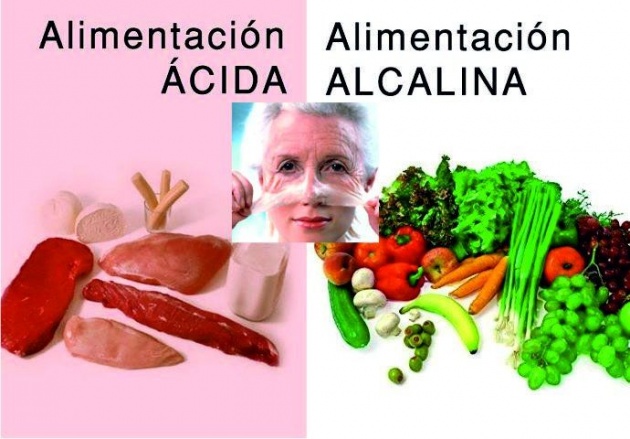
How the alkaline diet? What is and what foods are allowed and which to avoid? Menu and example
insights on risks, benefits and contraindications related to diet based on alkaline residues.
The alkaline diet is a diet devised by American Robert Young tended to prevent blood
develop too high a concentration of acidic substances. We know that the pH of our blood is apparent from budget of the concentration of acids and bases; If this balance is compromised, we will have problems such as acidosis lactic acidosis and ketosis and - according to Young - also a greater risk of developing overweight and cancer. We will see then is articulated as the alkaline diet, what foods are recommended and which prohibited and in what proportions. It is not, as often believed, a vegetarian diet, it is true that the meat is not included, but you give up the fish; for this we inserted a simple and tasty recipe with salmon and vegetables.
The Alkaline Diet: What is it?
The alkaline diet is a nutritional model devised by the American Robert Young, which would serve to limit strongly favor the production of acids and bases that, in order to prevent acidification of the blood and reduce the risk of developing several diseases.
The alkaline diet is based on the theory, developed by Young, according to which excess weight, water retention and diseases such as kidney stones, high cholesterol and cancer are all related to acidification of the blood. therapies Conventional - in his opinion - ineffective: chemotherapy and radiotherapy would aim only to eliminate cells cancerous, while surgery has the aim to remove the tumor tissue; according to Young, you should not delete the "Symptom", ie the tumor, but the cause that is too high a level of acid in the blood. The alkaline diet by acidification of the blood returning blood pH levels above 7. We must introduce food basic pH and avoid those acids, according to this scheme Daily: 70-80% alkaline foods. Foods to higher content of sodium, potassium, magnesium and calcium, are those that favor the production of bases, including sodium bicarbonate, the main substance capable of ensuring the acid-base balance of the blood; 20-30% of acidic foods. The foods that promote the production of acids are those containing sulfur, chlorine and phosphorus.
Recommended food: what to eat.
Lists all the foods with alkaline pH, up to 70-80% of daily energy intake. Here's the list of foods allowed:
- Vegetables: all but particularly chard, carrots, celery, spinach, cauliflower, broccoli, pumpkin;
- Fruit: apple, pear, banana, orange (also as juice), strawberries, cherries, mango, lime, grapefruit,pineapple, melon, grapes, dates, avocados;
- Fish: bass, trout, salmon, tuna;
- Cereals;
- Legumes (especially beans);
- Alkaline water: one of the cornerstones of the alkaline diet is a daily consumption of liquid higher or at least equal to 2 liters. Young or recommend to use purified tap water and basified with ionizers Chanson Water or to choose a water bottle and a low mineral content with a pH equal to or greater than 9.5;
- Green tea and herbal teas.
Forbidden foods: what to avoid.
Should be limited to 20-30% of daily energy intake foods that once metabolized release acids, namely:
- meat;
- eggs;
- Milk and cheese, especially cottage cheese: milk and dairy products contain lactose which would be converted into acid lactic acid, which as the name implies is an acid. The same applies to the soy milk;
- Nuts and peanuts;
- tomato;
- Beverages: tea, coffee, chocolate, red wine;
- Refined sugar (white).
Go then debunked the myth that the alkaline diet is a vegetarian diet. It 's definitely a diet free of meat, eggs and cheeses, but not devoid of fish, as Young advised to eat certain types of fish (salmon, tuna, sea bass, trout).
Advantages and disadvantages of the diet alacalina.
The advantages:
- High intake of fiber, vitamins and minerals thanks to the abundant consumption of vegetable
- Adequate water intake
- It encourages a healthier lifestyle:
- Moderate physical activity
- Regular hours
- Sleep duration not less than 8 hours
The disadvantages:
- Insufficient intake of carbohydrates and lipids (fats)
- It 'a very restrictive diet and far from our eating habits
- The results that Young promises benefits (weight loss and prevention and
treatment of diseases) are not yet proven by any study
To this should be added that the alkaline diet is not able to modify the pH of the blood, and it is risky to think that cancer can be cured with diet and without the use of other therapies (chemotherapy, radiation and surgery), and also the Young skills in terms of diet and nutrition are dubious.



